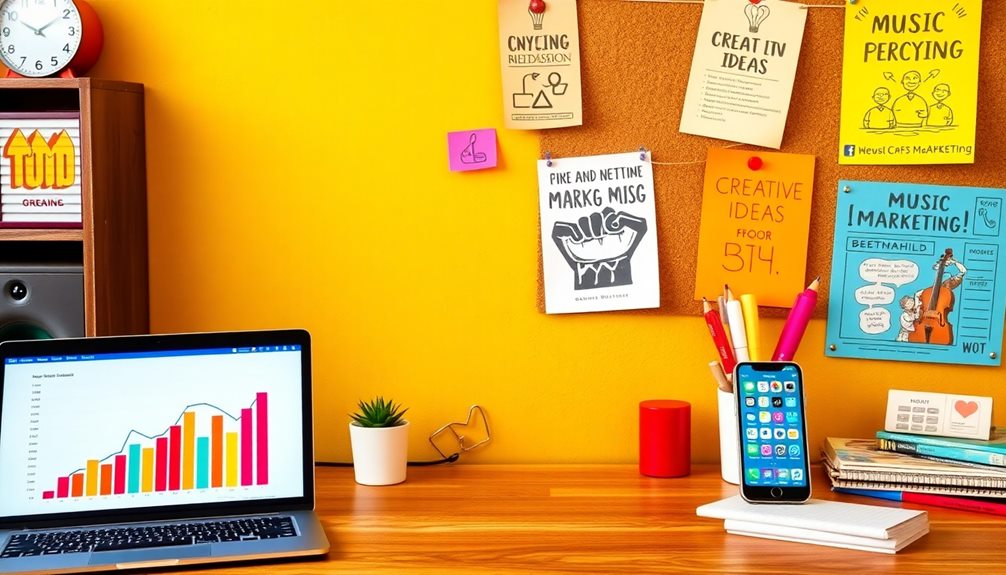To protect your music and earn money, you need to understand BMI copyright and how royalties work. Copyright gives you the exclusive rights to your music, so no one can use it without your permission. With BMI, you can collect different types of royalties, like performance royalties when your songs are played. It's also important to register your work with the U.S. Copyright Office for extra protection. This way, you can take action if someone misuses your music. By knowing about copyrights and royalties, you can maximize your earnings and keep your creations safe. There's a lot more to discover!
Key Takeaways
- BMI helps you collect performance royalties when your music is played publicly, ensuring you earn from your creations.
- Copyright grants exclusive rights to your music, protecting it from unauthorized use and ensuring long-term benefits.
- Registering your songs with the U.S. Copyright Office enhances legal protection and serves as proof of authorship.
- Understanding the differences between composition and sound recording copyrights maximizes your earning potential from various music uses.
- Utilize services like Cosynd for affordable copyright registration solutions to protect your music effectively.
Understanding Music Royalties
Understanding music royalties can feel overwhelming, but it's essential for anyone in the industry. Music royalties are the payments artists earn when their songs are played or used.
One type is performance royalties. You earn these when your music is played in public, like at live shows, on the radio, or even on streaming services. Organizations like BMI help collect these royalties for you, ensuring you get paid.
Another important type is mechanical royalties. These are paid when your music is reproduced, such as on CDs or streaming platforms. They go to songwriters and publishers, and companies like the Harry Fox Agency manage these collections.
You should also know about sync royalties. These are fees you earn when your music is used in movies, TV shows, or ads. To use your song, filmmakers need a special license called a synchronization license.
Knowing about performance royalties and how they work is vital for your success. By understanding music royalties, you can take better control of your earnings and enjoy your creative journey.
The Importance of Copyright
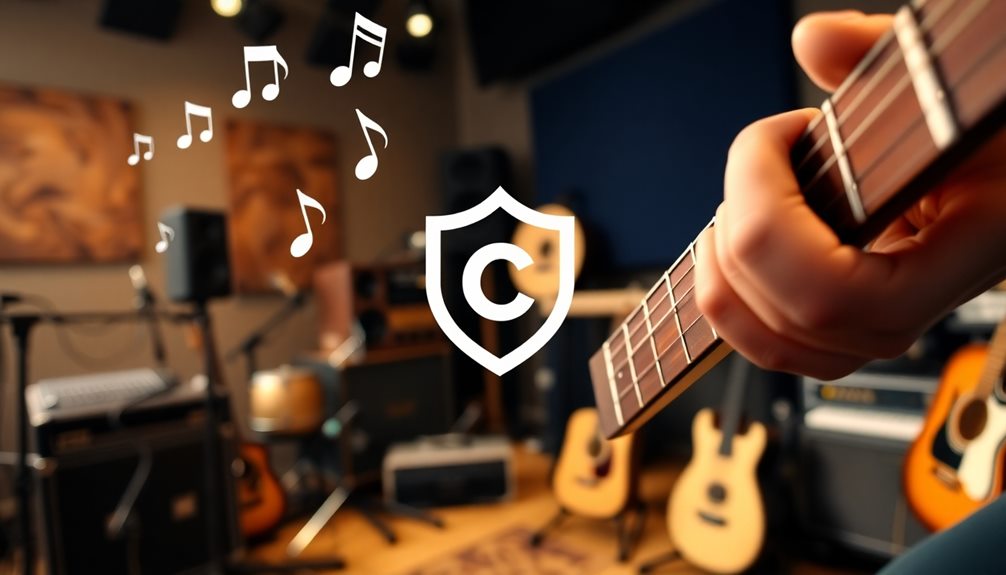
Protecting your music through copyright is essential for any artist looking to thrive in the industry. Copyright gives you exclusive rights to your music, like copying and distributing it. This means you get to earn royalties when others use your work! Plus, when you register your songs with the U.S. Copyright Office, you gain extra legal protection, making it easier to fight against anyone who might try to steal your hard work.
Here's a quick look at why copyright matters:
| Why Copyright is Important | Benefits |
|---|---|
| Protects your original work | Earn royalties for your music |
| Lasts for your life plus 70 years | Legal protection against theft |
| Distinguishes between rights | Opportunities for licensing |
Understanding copyright laws helps you navigate the music world. It guarantees you keep your rights and maximize your earnings. Remember, composition copyright and sound recording copyright are different, but both are important. They help you earn from performances and other uses of your music. So, take the time to learn about copyright—your future self will thank you!
How to Copyright Your Songs

When you create a song, you automatically own the copyright, which is super cool!
But to really protect your music, it's a smart idea to register it with the U.S. Copyright Office.
Automatic Copyright Acquisition
Creating a song automatically grants you copyright protection the moment it's written down or recorded. This means that as soon as you jot down your lyrics or hit the record button, you own the rights to that music! This is called automatic copyright acquisition. It's exciting to know that your creativity is protected right away.
While you get this protection automatically, registering your music with the U.S. Copyright Office is a smart move. Even though it's not required, it boosts your legal defenses if someone tries to use your song without permission, which is called copyright infringement.
If you want to register your song, you'll need to fill out a form—Form PA for music compositions or Form SR for sound recordings. There's a small fee, but it can be just $35 if you submit online!
Registering your music gives you proof of authorship. This proof can be very helpful if there's ever a dispute about who owns the rights.
Recommended Registration Process
Registering your songs is an essential step that can greatly enhance your legal protection.
Even though copyright for your music is automatically granted when you create it, going the extra mile with copyright registration is a great idea. To do this, you'll need to fill out the right form—Form PA for compositions or Form SR for sound recordings—through the U.S. Copyright Office. It's easy and costs just $35 online!
Once you register, you'll have documented proof of authorship, which is super helpful if there's ever a legal dispute.
Plus, if you make any changes or create new versions of your songs, keep records of those changes. That'll help protect your rights even more.
If you want to simplify the process, consider using services like Cosynd. They offer budget-friendly solutions for copyright registration, making it even easier for you to protect your music.
Types of Copyright Rights
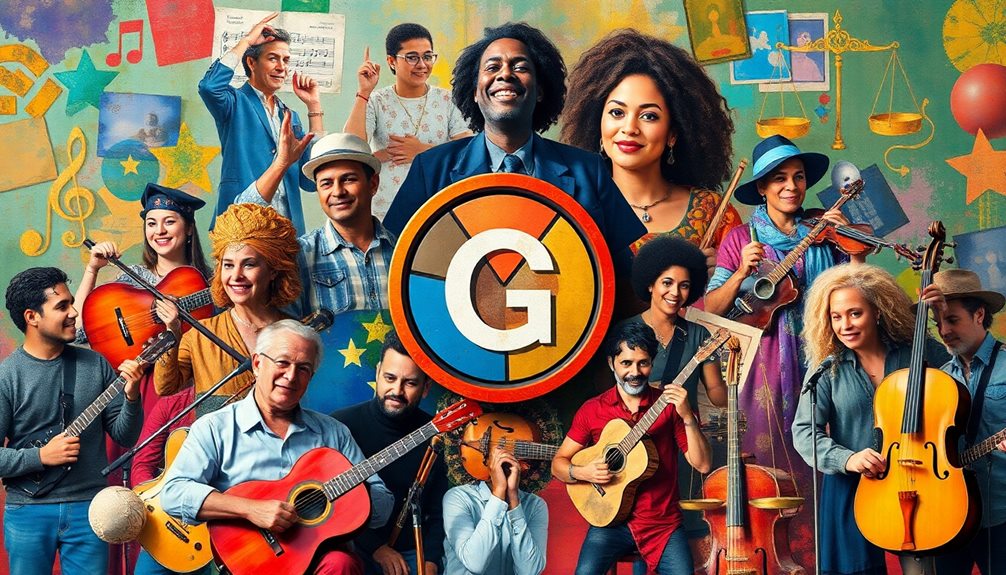
Understanding the various types of copyright rights is crucial for anyone involved in the music industry. These rights help you protect your hard work and earn money.
One important right is the public performing right. It lets you control where your music is played in public. When someone wants to play your song at a venue, they need a Public Performance License from organizations like BMI. This guarantees you receive performance royalties for your creations.
Another essential right is the reproduction right. This allows you to give permission for your music to be reproduced in different formats, such as CDs or digital downloads. If someone wants to make copies of your song on a physical medium, a mechanical license is required. This license is managed by the Mechanical Licensing Collective in the U.S.
Lastly, there's the synchronization license. This is necessary when your music is used alongside visual media, like in movies or commercials. Securing this license guarantees that you're legally compensated for the use of your music.
Protecting New Versions

When you modify a song to create a new version, it's important to protect your rights over that derivative work. This means you need to think about copyrighting your new arrangement. Doing so guarantees that others can't use your modified content without your permission.
To help you understand the steps, here's a quick table:
| Step | Description |
|---|---|
| 1. Document Changes | Write down any alterations you made. |
| 2. Copyright It | Confirm your new version qualifies as a copyrighted work. |
| 3. Register | Register the new version with the U.S. Copyright Office. |
| 4. Legal Proof | Having a registration provides proof of authorship. |
| 5. Protect Rights | Secure your rights against unauthorized use. |
Registering your new version is a smart move! It not only protects your work but also helps in case someone disputes authorship or copyright. Remember, every time you create a new arrangement, you're adding to your artistic journey. So, embrace it, and make certain your creative efforts are safeguarded!
International Copyright Protection

Steering through the complexities of international copyright protection can feel intimidating, but it's essential for safeguarding your music across borders. When you create music in the U.S., you're automatically protected in countries that are part of the Berne Convention. This means your rights as a copyright owner are recognized around the world, which is fantastic!
However, to fully enjoy the benefits of U.S. copyright law, registration with the U.S. Copyright Office is recommended. This registration not only strengthens your claim but also allows you to sue for infringement if someone uses your music without permission.
Plus, you can seek significant statutory damages, which is a great way to protect your hard work!
If you register a foreign work in the U.S., it gets extra protection too! This reciprocal agreement helps you fight against infringement more effectively.
Copyright Assignment and Reversion
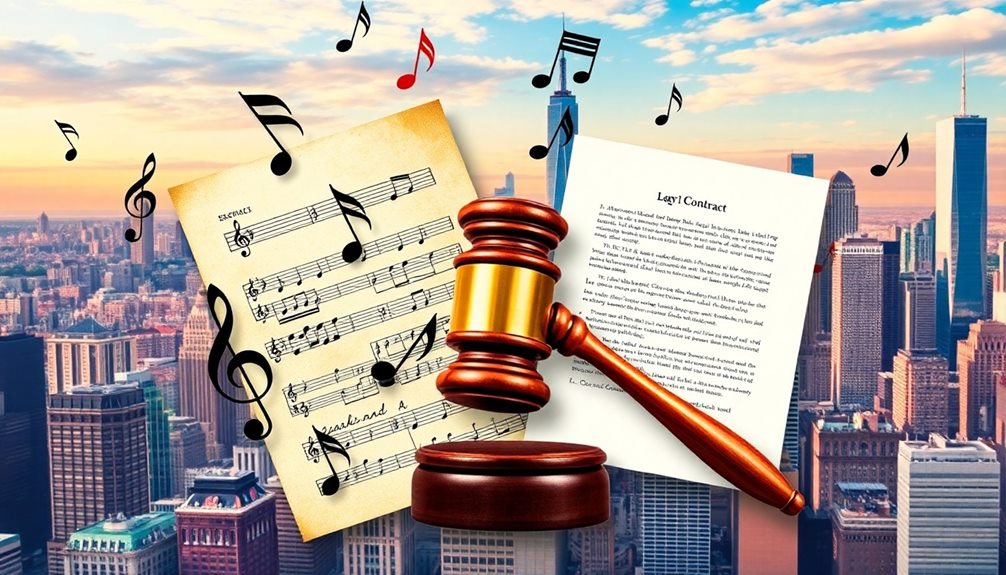
As you navigate the complexities of protecting your music, it's important to contemplate how copyright assignment and reversion play a role in your rights as a creator.
When you assign your copyright to a publisher, you're giving them certain rights over your music. But here's the exciting part: after 35 years from publication or 40 years from assignment, you can reclaim rights! This applies as long as your work wasn't made for hire and the assignment happened after January 1, 1978.
To reclaim your rights, you'll need to send a written notice to the publisher. This step is essential! Your heirs can also reclaim rights, so make sure they know the process.
Remember that copyright assignments must be formalized through a written agreement. Oral agreements don't count and can lead to confusion about who owns what.
It's wise to register your assignment with the U.S. Copyright Office. This gives you legal protection and a public record of the transfer.
Clear terms in your assignment agreement help prevent future disputes over ownership and usage rights. So, stay informed and keep your music safe!
Distinction Between Copyright Types
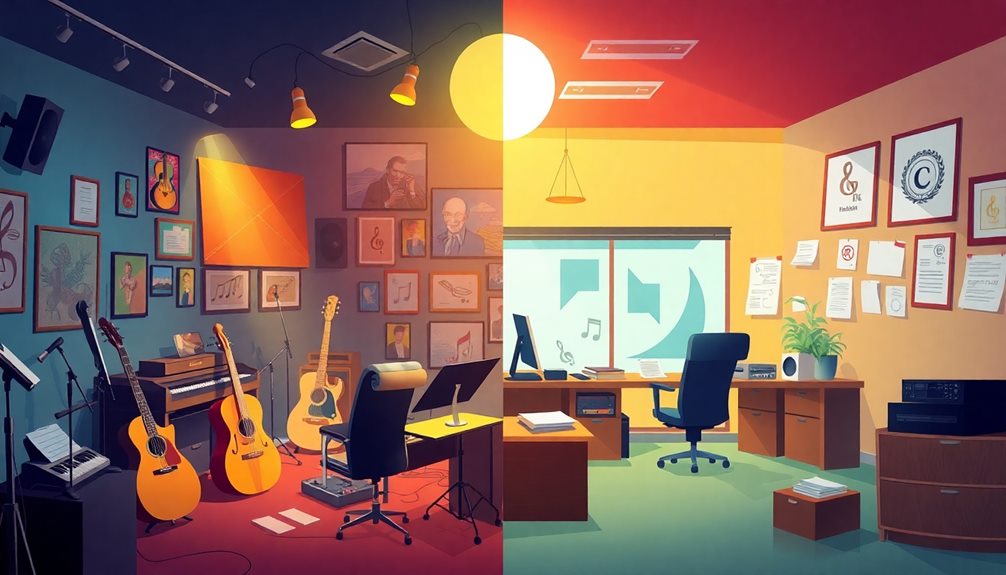
Understanding the difference between sound recording copyright and composition copyright is super important for you as a musician!
While composition copyright protects the music and lyrics you create, sound recording copyright focuses on the actual performance of your song.
Sound Recording Copyright
Maneuvering the complexities of copyright can be challenging, especially when distinguishing between sound recording copyright and composition copyright.
Sound recording copyright protects the actual audio performance of a song. This is usually owned by record labels. On the other hand, composition copyright safeguards the song's lyrics and melody, often owned by songwriters or publishers.
To get sound recording copyright, you need to file Form SR with the U.S. Copyright Office. This is different from the composition copyright, which requires Form PA.
It's important to know that a single song can have multiple sound recording copyrights. If different artists record the same song, each version needs its own registration!
Owning sound recording copyright is essential. It allows artists and labels to control how their music is distributed and reproduced.
Unlike composition copyright, which typically involves a performance rights organization (PRO) for collecting royalties, sound recording copyright is managed mostly through record labels and licensing deals.
Understanding these differences helps you protect your music and earn mechanical royalties effectively.
Song Copyright Protection
Copyright protection for songs hinges on two distinct types: composition copyright and sound recording copyright.
Composition copyright protects the music and lyrics you've created, while sound recording copyright protects the actual recording of your song. This means if you write a beautiful song, you have one composition copyright, but if different artists record it, each version gets its own sound recording copyright.
When your song is performed publicly, you can earn performance royalties. This is where Performing Rights Organizations (PROs) like BMI come in.
They help you collect those royalties, ensuring you get paid when your music is played in venues, on the radio, or even on TV!
Licensing and Ownership Rights
When it comes to music, knowing the difference between licensing and ownership rights can greatly impact your success as an artist. As a copyright owner, you hold exclusive rights to your music. This includes the ability to copy, distribute, and perform your work.
There are two main types of music copyright: composition copyright and sound recording copyright. Composition copyright protects the lyrics and melody, while sound recording copyright covers the actual recorded performance, often owned by record labels.
One song can have one composition copyright but multiple sound recording copyrights. This is important because it means you can earn money through different licensing opportunities for each version. When your music is played in public or broadcast, you want to make sure you're compensated. That's where Performing Rights Organizations (PROs) like BMI come in. They manage performance royalties, ensuring that you get paid whenever your music is performed.
Don't forget, registering your music with the U.S. Copyright Office is essential if you want to protect your rights and pursue legal action against infringement. By understanding licensing and ownership, you're setting yourself up for success!
Copyright Infringement Consequences
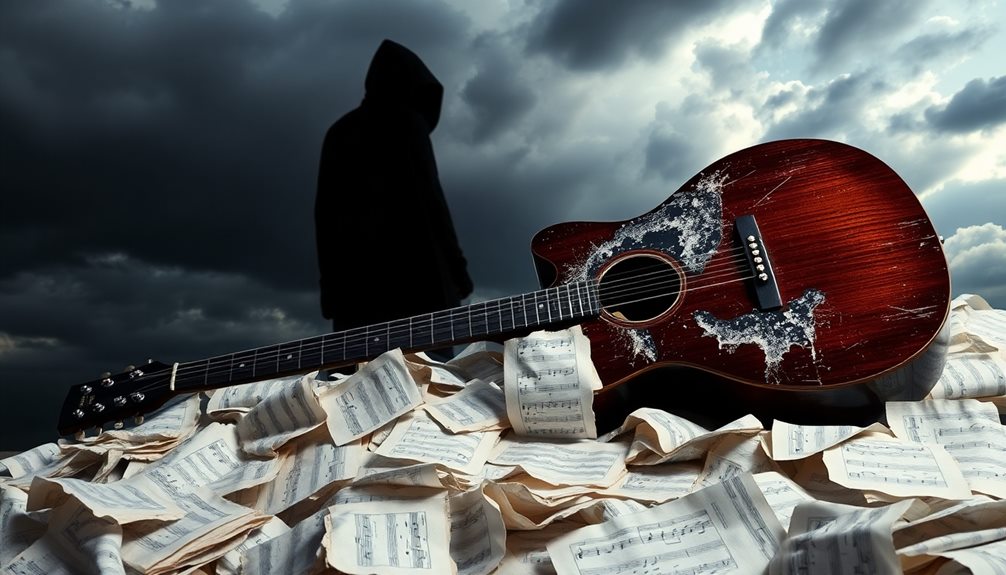
Facing the repercussions of copyright infringement can be intimidating, as the financial penalties can add up quickly. If you copy someone else's music without permission, you could face statutory damages ranging from $750 to $30,000 for each infringement.
If it's determined that your infringement was willful, those damages could skyrocket to $150,000! This can have a huge impact on your finances in the music industry.
It's important to understand that a jury usually decides these damages, which means having legal representation is vital. You want someone who knows the ins and outs of copyright laws to help you.
Plus, if you're serious about protecting your music, registering it with the U.S. Copyright Office is a must. This step gives you the legal standing needed to pursue any infringement cases.
Businesses that use music without proper licensing can also face significant fines.
Resources for Songwriters
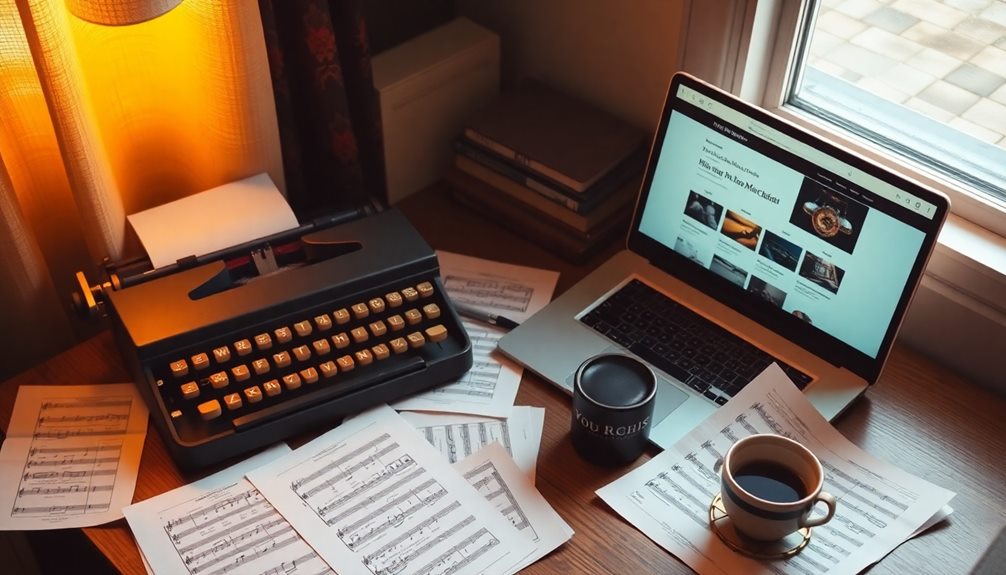
Understanding your rights is just the beginning for songwriters; having access to the right resources can make all the difference. As a songwriter, you've got plenty of options to help you navigate the music world. Organizations like BMI offer great support through their Writer/Publisher Relations department. They can help you understand Copyright Law and answer your questions about performance royalties.
Here's a handy table to explore some essential resources:
| Resource | Description | Benefits |
|---|---|---|
| BMI Writer/Publisher Relations | Guidance on copyright issues | Answers to common questions |
| U.S. Copyright Office | Official site for copyright registration | Info on legal protections |
| BMI Membership | Free to join, with direct deposit payments | Discounts on music gear |
| BMI Advocacy | Support for music rights | Community support |
| BMI Press Room | Updates on copyright inquiries | Helpful resources |
Frequently Asked Questions
Does BMI Copyright Your Music?
No, BMI doesn't copyright your music. It helps collect and distribute performance royalties, but you should register your work with the U.S. Copyright Office for legal protection and to establish a public record.
Do I Have to Pay BMI Music?
Yes, you have to pay BMI if you want to legally play music in public. The fees depend on your venue's size and location, ensuring songwriters are compensated for their work.
What Are the BMI Rules for Music?
Did you know that BMI collects over $1 billion in royalties annually? To comply with BMI rules, you must register your music, avoid unauthorized use, and guarantee licensing is secured for public performances.
Why Should I Register My Music With BMI?
Registering your music with BMI guarantees you earn performance royalties when your songs are played. It's free, gives you legal protection, and connects you to a vast network that maximizes your earning potential in the industry.
Conclusion
So, protecting your music is like wrapping it in a magical shield! When you copyright your songs, you're not just keeping them safe; you're opening the door to amazing opportunities to earn money and share your art with the world. Imagine every note you create turning into a treasure! By understanding your rights and how to protect them, you can let your creativity shine bright. Start today, and let your music make waves!





